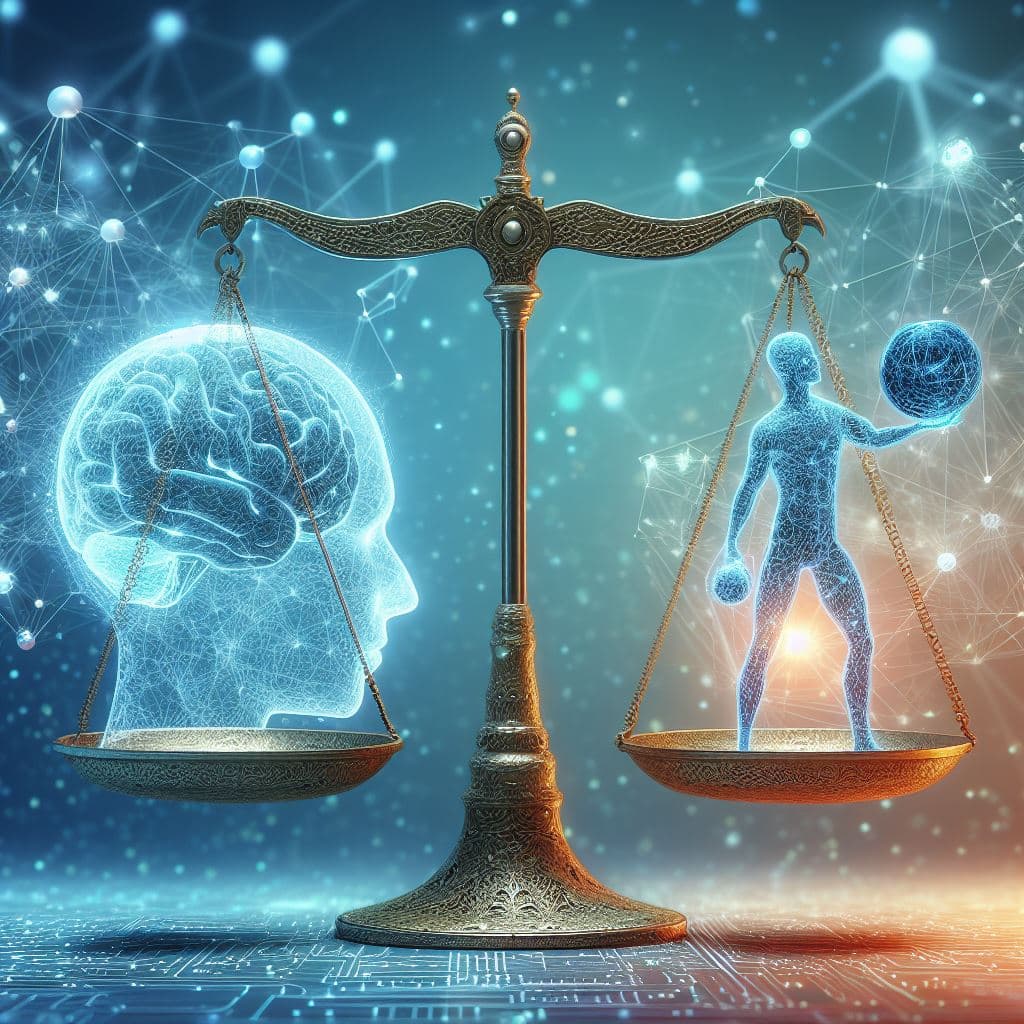
Artificial Intelligence (AI) has revolutionized our world with its ability to automate tasks, improve efficiency and transform entire industries. However, along with these advances come ethical challenges and responsibilities that we must address to ensure responsible use of this technology. In this article, we will explore how to find the right balance between AI innovation and the ethical responsibility that comes with it.
Benefits of AI Innovation
Advances in AI have brought with them a number of tangible benefits in diverse areas of life and business. From automating repetitive tasks to improving real-time decision making, AI innovation is transforming the way we work and live.
Technological advances
AI has enabled the automation of a wide range of tasks, from customer service to inventory management. Intelligent algorithms can analyze large volumes of data and make accurate predictions, leading to greater operational efficiency and cost savings.
Impact on various industries
AI is having a significant impact in sectors such as healthcare, finance and education. In medicine, AI systems can diagnose diseases more accurately and recommend personalized treatments. In finance, AI algorithms are revolutionizing risk management and fraud detection. In education, AI is being used to personalize teaching and improve student outcomes.
Ethical Challenges and Responsibilities
Despite the benefits of AI, we also face a number of ethical challenges and responsibilities that must be urgently addressed. Algorithmic bias, data privacy, and transparency in the development of the technology are just some of the issues we must address.
Algorithmic bias
AI algorithms can be biased due to the data they are trained on, which can lead to discriminatory or unfair decisions. It is crucial to identify and mitigate these biases to ensure that AI acts fairly and equitably in all situations.
Privacy and data security
The use of large amounts of personal data in AI systems raises concerns about privacy and information security. It is critical to establish clear policies and regulations to protect sensitive data and ensure that it is used ethically and responsibly.
Legal and Regulatory Framework
To address the ethical challenges of AI, a sound legal and regulatory framework is needed that establishes clear rules and defined responsibilities for all parties involved.
Existing legislation
In many countries, laws and regulations already exist that address issues related to personal data protection and online privacy. However, the rapid evolution of AI requires more specific and up-to-date legislation that reflects the new challenges and risks associated with this technology.
Need for specific regulations
It is essential to develop specific regulations that address ethical issues and responsibilities in the design, development and use of AI systems. This includes promoting transparency in algorithms, protection of user privacy, and accountability of companies and organizations using this technology.
Corporate Responsibility
Companies and organizations that develop and use AI systems have an ethical responsibility to ensure that their technology is used in a way that is responsible and beneficial to society as a whole.
Ethics in AI development
Companies must integrate ethical considerations into all stages of the lifecycle of AI systems, from conception and design to real-world implementation and deployment. This includes identifying and mitigating algorithmic biases, protecting data privacy, and promoting fairness and justice in all applications of the technology.
Education and awareness
Educating developers, users and society at large about the risks and benefits of AI, as well as best practices for its development and ethical use, is critical. This includes training in AI ethics, raising awareness of the risks of algorithmic bias, and promoting diversity and inclusion in technology development.
Interdisciplinary Collaboration
To address the ethical challenges and responsibilities of AI, an interdisciplinary approach involving experts in technology, ethics, law, policy and other relevant areas is needed.
Cooperation between technology and humanities
It is essential to foster collaboration between technologists and humanities experts to ensure that AI is developed in an ethical and responsible manner. Philosophers, ethicists, and sociologists can offer critical perspectives on the ethical and social implications of the technology, while technologists can provide insight into the technical limitations and possibilities of AI.
Dialogue between the public and private sectors
Collaboration between the public and private sectors is essential to develop effective policies and regulations that address the ethical challenges and responsibilities of AI. This includes the involvement of governments, businesses, non-governmental organizations and civil society in policy formulation and decision making related to the technology.
Future of Responsible AI
As AI continues to advance and evolve, it is critical to maintain a focus on developing ethical and responsible technology that benefits society as a whole.
Advances in ethical research
Research in AI ethics is ongoing, with experts from diverse disciplines working together to develop ethical frameworks and guidelines for the design, development and use of AI systems. This includes developing unbiased algorithms and promoting transparency and accountability in all applications of the technology.
Impact on society
Responsible AI has the potential to improve people’s lives, increase equity and justice in society, and address some of the world’s most pressing challenges. However, it also poses significant challenges and risks that must be urgently and effectively addressed.
Benefits of responsible AI
Responsible AI can improve the accuracy and fairness of decisions, protect the privacy of personal data, and promote inclusion and diversity in all areas of society. This can lead to better outcomes in areas such as healthcare, criminal justice, education, and natural resource management.
Future challenges and opportunities for improvement
Despite advances in AI ethics research, there are still many challenges ahead that we must effectively address. These include identifying and mitigating algorithmic biases, protecting data privacy, and promoting fairness and justice in all applications of the technology. However, with a collaborative approach and a commitment to ethics and accountability, we can work together to build a future in which AI benefits everyone.
